Select Language

By Nate Raymond
(Reuters) -Two federal judges in Kansas and Missouri on Monday at the urging of several Republican-led states blocked President Joe Biden's administration from further implementing a new student debt relief plan that lowers payments.
U.S. District Judge Daniel Crabtree in Wichita, Kansas, blocked the U.S. Department of Education from implementing parts of a student loan repayment plan not already in effect that cuts borrowers' monthly payments and provides a faster path to have debts forgiven.
He ruled shortly before U.S. District Judge John Ross in St. Louis, Missouri, issued a preliminary injunction barring the department from granting further loan forgiveness under the administration's Saving on a Valuable Education (SAVE) Plan.
The SAVE plan provides more generous terms than past income-based repayment plans, lowering monthly payments for eligible borrowers and allowing those whose original principal balances were $12,000 or less to have their debt forgiven after 10 years.
Missouri Attorney General Andrew Bailey, a Republican who helped lead the litigation, hailed Ross' decision. "Congress never gave Biden the authority to saddle working Americans with half-a-trillion dollars in other people's debt," he wrote on social media platform X.
The White House said it strongly disagreed with the rulings and criticized Republican elected officials who have fought against student debt forgiveness.
"Today's rulings won't stop our administration from using every tool available to give students and borrowers the relief they need," White House Press Secretary Karine Jean-Pierre said in a statement.
Biden, a Democrat, announced the SAVE Plan in 2022, alongside a broader $430 billion program that would have fulfilled a campaign promise by cancelling up to $20,000 in debt for up to 43 million Americans. It was ultimately blocked by the conservative- majority U.S. Supreme Court in June 2023.
The SAVE Plan was slated to fully take effect on July 1, though parts of it already been implemented, with 414,000 borrowers by mid-May having been granted $5.5 billion in debt relief, according to the Education Department.
The White House has said that over 20 million borrowers could benefit from the SAVE Plan. The administration in May said that 8 million are already enrolled, including 4.6 million whose monthly payments have been reduced to $0.
Eleven states challenged the plan in a lawsuit in Kansas. Crabtree had recently dismissed eight of the states' claims, but allowed South Carolina, Texas and Alaska to push forward. Seven other states sued in Missouri.
Neither judge on Monday ordered any debt relief already granted unwound. Crabtree said the Republican-led states waited too long to sue to claim they were being irreparably harmed by the in-effect aspects of the SAVE Plan.
But Crabtree, who like Ross was appointed by Democratic former President Barack Obama, said the Higher Education Act of 1965 did not clearly authorize the type of "unprecedented and dramatic expansion" of income-based repayment plans envisioned.
He cited an estimate by lawyers for the Republican-led states of South Carolina, Texas and Alaska that the SAVE Plan would carry a price tag of $475 billion over 10 years.
Ross, ruling in favor of seven states led by Missouri, reached a similar conclusion in finding the department "overstepped its authority by promulgating a loan forgiveness provision as part of the SAVE program."
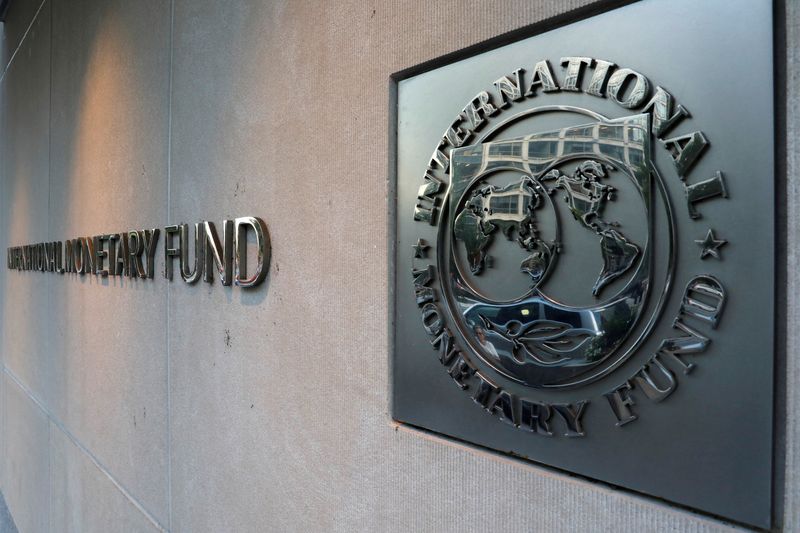
WASHINGTON (Reuters) - The International Monetary Fund said on Monday its Executive Board has concluded a second review of Bangladesh's bailout program, giving the country immediate access to about $928 million in loans for economic support and about $220 million to combat climate change.
"Bangladesh’s economy is navigating multiple macroeconomic challenges," IMF Deputy Managing Director Antoinette Sayeh said in a statement.
"Even in the difficult environment, program performance has been broadly on track and the authorities remain committed to undertaking the necessary policy actions and reforms," she said.
Bangladesh's $4.7 billion bailout was approved by the fund's Executive Board in January 2023.
The board's first review of the bailout plan was cleared in December and gave Bangladesh immediate access to about $468.3 million for its economy and about $221.5 million in support of its climate change agenda.
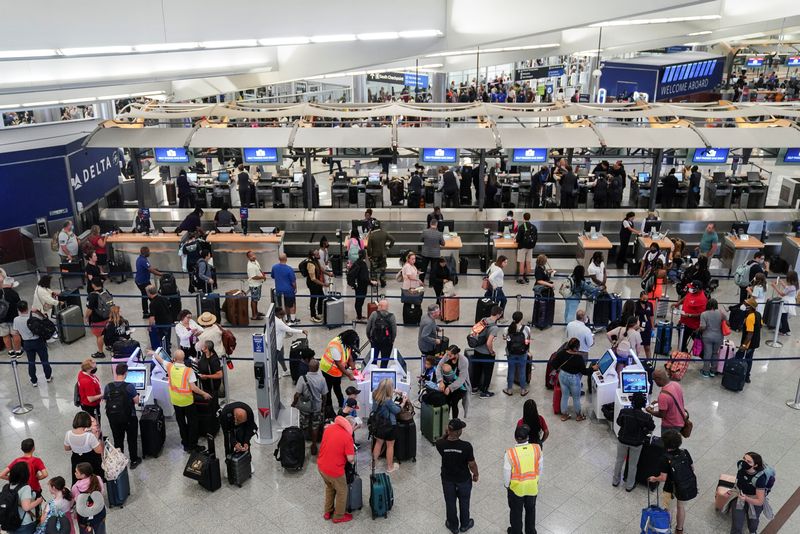
By David Shepardson
WASHINGTON (Reuters) - The U.S. Transportation Security Administration said it had screened 2.99 million airline passengers on Sunday, the highest-ever number in a single day.
The agency said on Monday it expects to screen more than 32 million travelers during the 2024 Independence Day travel period that runs from Thursday through July 8, which is 5.4% higher than 2023 levels.
The TSA said it expects on Friday it will for the first time screen more than 3 million people, the busiest day expected during the upcoming holiday period. Sunday's record broke the prior high of 2.95 million set in late May, while seven of the 10 busiest travel days ever have occurred over the past month.
A group representing major U.S. airlines forecast record summer travel with airlines expected to transport 271 million passengers, up 6.3% from last year.
Industry group Airlines for America said U.S carriers plan to fly more than 26,000 daily flights this summer, up nearly 1,400 or 5.6% over 2023, when they carried 255 million passengers. The summer travel season forecast is for June 1 to Aug. 31.
The forecast comes as the Federal Aviation Administration is struggling to address a persistent shortage of air traffic controllers. Some airlines voluntarily trimmed New York flights last summer to address congestion issues and have raised new concerns about the lack of controllers.
The FAA said on June 5 it would again extend cuts to minimum flight requirements at congested New York City-area airports through October 2025, citing shortages of air traffic control staff.
The FAA said the number of controllers handling traffic in New York is insufficient for normal traffic levels and that without "increased flexibility," congestion, delays, and cancellations are likely at JFK, LaGuardia and Newark airports.
Under minimum flight requirements, airlines can lose their takeoff and landing slots at congested airports if they do not use them at least 80% of the time. The FAA's waiver allows airlines to fly fewer flights and still retain slots.
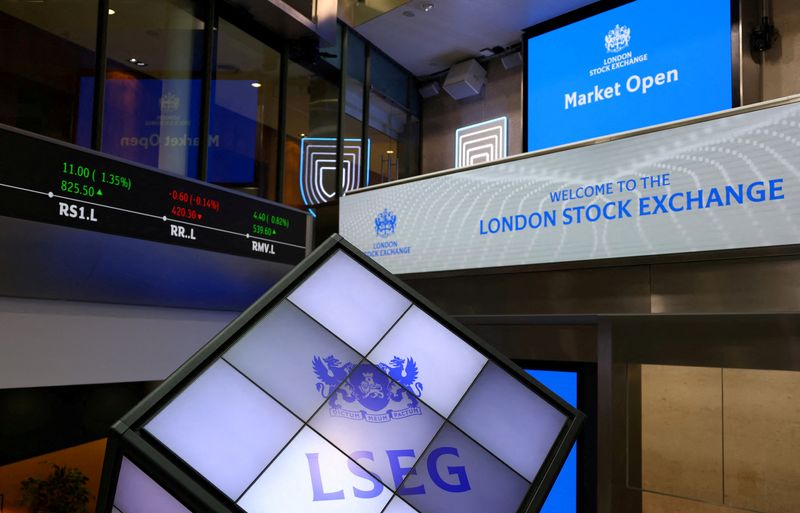
(Reuters) - London's FTSE 100 was flat on Monday as investors turned cautious ahead of key inflation data in the United States, while a downtick in oil and copper prices weighed.
The blue-chip FTSE 100 was unchanged after touching a two-week high on Friday, while the mid-cap FTSE 250 was off 0.1% at 0709 GMT.
The energy sector fell 0.3%, in tandem with oil prices, as concerns of higher-for-longer interest rates in the U.S. strengthened the dollar. [O/R]
Industrial miners slipped 0.7%, as concerns of muted Chinese demand kept traders on the sidelines, pulling down copper prices. [MET/L]
The Bank of England (BoE) kept interest rates unchanged on Thursday, with renewed hopes of an August rate cut after comments from policymakers.
A domestic inflation report last week showed that headline inflation in the economy had fallen to 2% - the BoE's target.
In the U.S., the personal consumption expenditure numbers (PCE) are due on Friday. Investors are banking on the data to show a renewed moderation in inflation.
Also due are the gross domestic product numbers in the UK, that will shed more light on the state of the British economy, after strong retail sales data on Friday tempered some optimism from the BoE's comments.
Prudential gained 4.6% after the insurance group said it planned a $2 billion share buyback programme, to be completed by mid-2026.
Shares of HG Group gained 4.7% after the ecommerce company agreed to sell its portfolio of luxury goods website to Fraser's Group for an undisclosed sum. Fraser's Group was up 0.9%.
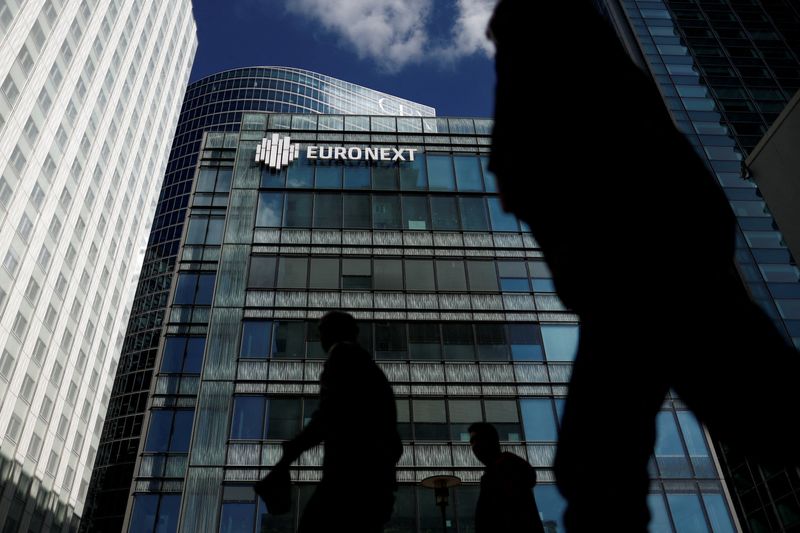
By Anousha Sakoui, Emma-Victoria Farr and Elisa Anzolin
LONDON (Reuters) -The European IPO market is unlikely to see any new candidates until after the summer, as political uncertainty has roiled markets, bankers said.
This week Italian luxury sneaker brand Golden Goose and Spanish fashion retailer Tendam both postponed planned listings citing the impact that France's snap election had on markets.
The election call last week in response to a drubbing in a European Union vote by the far right pushed down the euro while French blue-chip stocks dropped and bonds tumbled.
But several bankers stress the market is not closed for deals, as year to date share sale volumes have staged a recovery. In one example this week, frozen bakery goods company Europastry announced its intention to list in Spain and raise at least 225 million euros.
"I don't think the market is closed but clearly for an IPO market that was tentatively recovering it has been a bit of a knock," said Andreas Bernstorff, head of equity capital markets at BNP Paribas (OTC:BNPQY).
Even if there are fewer IPO candidates as political uncertainty continues, with some even shifting their plans to 2025, share sales in already listed companies will continue, bankers said. Block trades are still popular with investors with around $150 million shares in Johannesburg-listed Momentum Metropolitan sold this week.
"The recent volatility we have seen around French elections is more likely to affect continental European transactions which are sensitive to the macroeconomic environment, but equally there is a good debate in Europe around pro-growth policies which could benefit investor sentiment," said Alex Watkins, co-head of equity capital markets international at JP Morgan.
Share sales across Europe, Middle East and Africa year to date have reached $89.8 billion, up 45% from the same period last year, Dealogic data shows. That is still off the recent high of $168 billion for the same period in 2021.
The value of IPOs year to date stands at $19.5 billion, up 117% from the same period last year, with successful offerings from CVC, Galderma and Puig.
But the shock announcement of a parliamentary election in France which kicks off June 30 caused a spike in volatility and a sell-off in stocks. Last week the Euro STOXX 50 volatility index jumped to its highest level since October.
On Tuesday night Golden Goose, which makes $500 sneakers, and its owner buyout fund Permira, decided to pull an IPO it had announced at the end of May. The at least 508 million euro offering was thrown into doubt as shares of France's LVMH and another luxury peer Moncler sank.
Part of Permira's decision was uncertainty over the after-market, notably given the performance of another of its IPOs Dr Martens, people familiar with the matter said. The British bootmaker's shares are down 78% since its 2021 float. Permira declined to comment.
The summer is typically a quieter period for new issues and some bankers have been warning that investors are being selective about the deals they will back.
"There is a moderate pipeline post summer, but it won't be a bonanza," Watkins said. "The pipeline is building strongly for 2025 onwards."
Investors are concerned about the potential impact of the French elections and are worried about what a surge to the right politically will mean for the European Union, and for issues like Ukraine and fiscal policy, one equity capital markets banker said, speaking on condition of anonymity.
The U.S. elections in the autumn are also likely to have an impact on the timing of IPOs, but bankers believe investors are less concerned about the potential for market volatility. That could mean a better chance for those companies looking to list from September onwards.
"There are some IPOs that are lining themselves up to come after the summer and they might have a better shot than previously thought," Bernstorff said.
Companies including German academic publisher Springer Nature and drugmaker Stada could IPO later this year, Reuters reported recently.
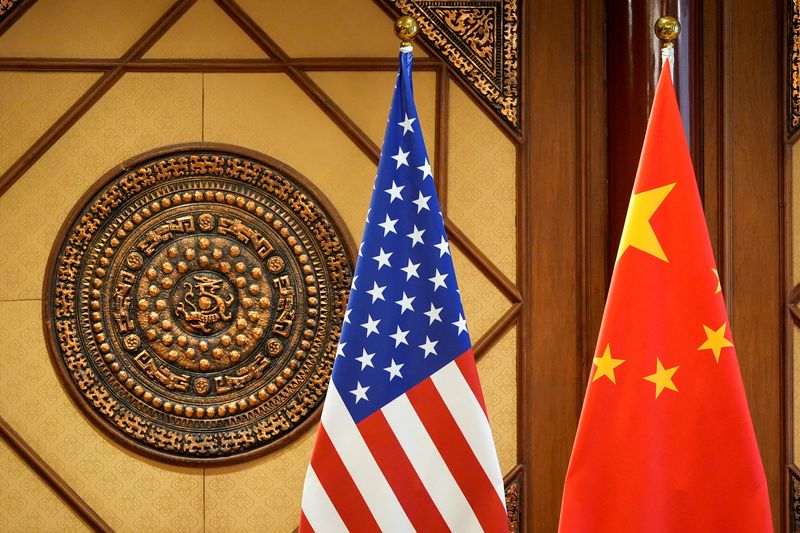
BEIJING (Reuters) - China is gravely concerned and firmly opposed to U.S. proposed rules for curbing certain investments in China, and reserves the right to take corresponding measures, the Chinese commerce ministry said on Monday.
The U.S. should "stop politicising and weaponising economic and trade issues, and lift investment restrictions on China," the ministry said in a statement.
Washington issued on Friday draft rules for banning or requiring notification of certain investments in artificial intelligence and other technology sectors in China that could threaten U.S. national security.

By Andrea Shalal, David Lawder, Karen Freifeld
WASHINGTON/NEW YORK(Reuters) -The United States on Friday issued draft rules for banning or requiring notification of certain investments in artificial intelligence and other technology sectors in China that could threaten U.S. national security.
The U.S. Treasury Department published the proposed rules and a raft of exceptions after an initial comment period following an executive order signed by President Joe Biden last August. The rules put the onus on U.S. individuals and companies to determine which transactions will be restricted or banned.
Biden's executive order, which directed regulation of certain U.S. investments in semiconductors and microelectronics, quantum computing and artificial intelligence, is part of a broader push to prevent U.S. know-how from helping the Chinese to develop sophisticated technology and dominate global markets.
The U.S. is on track to implement regulations by the end of the year as anticipated. Public comments on the proposed rules will be accepted until Aug. 4.
"This proposed rule advances our national security by preventing the many benefits certain U.S. investments provide - beyond just capital - from supporting the development of sensitive technologies in countries that may use them to threaten our national security,” said Treasury Assistant Secretary for Investment Security Paul Rosen.
Treasury said the new rules were intended to implement "a narrow and targeted national security program" focused on certain outbound investments in countries of concern.
Treasury had mapped out the contours of the proposed rules in August. The Treasury Department on Friday included additional exceptions, such as for transactions deemed to be in the U.S. national interest.
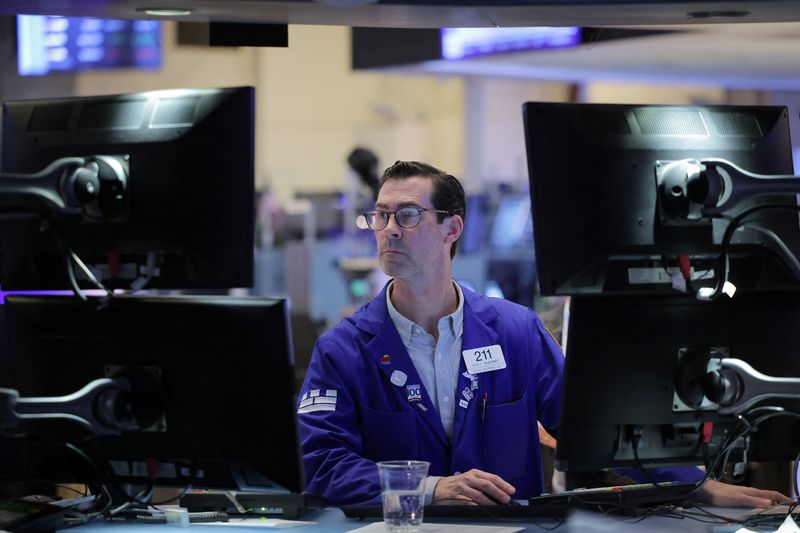
Investing.com -- For investors trying to assess how soon interest rate moves are likely to come a closely watched U.S. inflation gauge along with preliminary June inflation data from some euro zone economies will be in the spotlight this week. Concerns over signs of big tech exhaustion plus escalating trade tensions are also in focus. Here’s your look at what's happening in markets for the week ahead.
US inflation
The Fed’s favoured inflation gauge, the personal consumption expenditures price index is due for release on Friday and should show whether a nascent slowdown in inflation is continuing.
But recent PCE readings have not been in line with expectations. The latest reading showed U.S. inflation unexpectedly tracking sideways in April.
Another such reading could undermine the argument that rate cuts are coming soon. Unlike the Fed, markets are still holding out for two rate cuts this year.
The economic calendar also includes June data on consumer confidence along with May data on both new and existing home sales. There is also a third estimate of first-quarter economic growth, plus data on durable goods orders for May.
Tech rally may be overheating
Many investors believe the long-term case for tech stocks is solid, given their strong earnings and excitement over the revolutionary potential of artificial intelligence. But huge price gains, including Nvidia (NASDAQ:NVDA)'s 155% year-to-date run, have stirred worries that the tech rally might be getting stretched.
Market laggards such as small caps and so-called value stocks such financials and industrials may be looking like bargains.
But even if a pullback does occur, there are few signs’ investors would leave tech and growth stocks for long. Betting against tech has been a losing proposition over the last decade, as the Nasdaq 100 index has advanced more than 400% while the Russell 1000 Value is up about 70% over the same time.
Tech could also rebound fairly quickly as investors rush to buy the dip.
Oil prices
Oil prices eased about 1% on Friday on worries that global oil demand growth could be hit by a strong U.S. dollar and negative economic news from some parts of the world.
For the week, both crude benchmarks were up about 3% after gaining about 4% the previous week.
The U.S. dollar rose to a seven-week high versus a basket of other currencies Friday with the Federal Reserve's patient approach to cutting interest rates contrasting with more dovish stances elsewhere.
Lower rates could support oil prices, which have been dragged this year by lackluster global demand. A U.S. rate cut would make borrowing cheaper in the world's largest economy, galvanizing the appetite for oil as production picks up.
In the week ahead oil prices are also likely to remain supported by growing geopolitical risk premium.
Eurozone inflation
In the euro zone, France, Italy and Spain are to release preliminary June inflation data on Friday.
The data will set the tone for a euro zone-wide print the following week, key for traders trying to gauge how many times the European Central Bank will cut rates this year.
The ECB cut rates on June 6, but still strong domestic inflation and wages have raised question marks on how many more will follow.
Traders expect one more cut and a roughly 64% chance of a second by year-end, down from nearly 80% before the June meeting.
Any upside surprise would sour the mood for investors grappling with fresh political uncertainty after French President Emmanuel Macron called a first round French election on June 30.
Trade tensions
China and the European Union have agreed to start talks on the planned imposition of tariffs on Chinese-made electric vehicles (EVs) being imported into the European market.
Earlier this month Brussels proposed hefty duties to combat what the European Union considers excessive subsidies. The EU's provisional duties of up to 38.1% on imported Chinese EVs are set to apply by July 4, before coming into full effect in November.
The European Commission's June 12 announcement followed a move by the United States to hike tariffs on Chinese cars in May and opens a new front in the West's trade war with Beijing.
Chinese authorities have hinted at possible retaliatory measures through state media commentaries and interviews with industry figures.
--Reuters contributed reporting
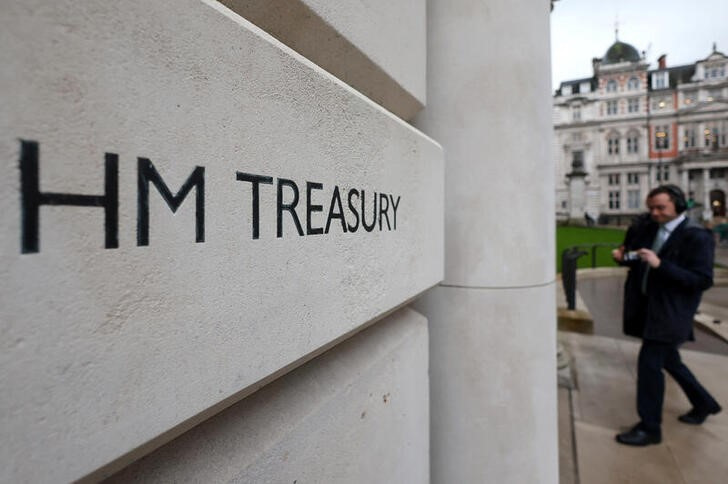
LONDON (Reuters) - British public debt rose last month to its highest as a share of the economy since 1961, official figures showed on Friday, adding to the financial pressures faced by the country's next government after an election on July 4.
Public sector net debt, excluding state-controlled banks, rose to 2.742 trillion pounds ($3.47 trillion) or 99.8% of gross domestic product in May, up from 96.1% a year earlier, the Office for National Statistics said.
The increase came despite slightly lower than expected government borrowing in May, which came in at 15.0 billion pounds, just below economists median forecast of 15.7 billion pounds in a Reuters poll.
Borrowing in the first two months of the financial year totalled 33.5 billion pounds, 0.4 billion more than during the same period in 2023.
Britain looks headed for a change of government following the election next month, as Keir Starmer's Labour Party is far ahead of Prime Minister Rishi Sunak's Conservatives in the polls.
Public debt soared in Britain during the COVID-19 pandemic, and the public finances have also been hit by slow growth and a rise in Bank of England interest rates to a 16-year high.
Both Labour and the Conservatives have pledged not to raise the rate of income tax, value-added tax or other major levies, but government budget forecasts in March showed tax as a share of GDP was on track to reach its highest since 1948.
($1 = 0.7897 pounds)
Labour and the Conservatives intend to stick with existing budget rules which require official forecasts to predict that debt as a share of GDP will fall between the fourth and fifth years of the forecast.
Labour has said it will aim to run a balanced budget for day-to-day spending, but will borrow for longer-term investment. The Conservatives aim to keep the overall deficit no higher than 3% of GDP.

By Rajendra Jadhav
(Reuters) - Food inflation in India, driven by supply-side factors like adverse weather affecting crops, has remained at around 8% year-on-year since November 2023 and is unlikely to ease any time soon, despite early arrival of monsoon rains and forecasts of above-normal rainfall.
Elevated prices of food, which accounts for nearly half of the overall consumer price basket, has kept headline inflation above the central bank's target of 4%, preventing it from cutting interest rates.
WHAT IS DRIVING FOOD INFLATION HIGHER?
A drought last year and an ongoing heat wave have significantly reduced the supplies of foods like pulses, vegetables, and cereals.
Curbs on food exports and reducing tariffs on imports have had little effect.
Although vegetable supplies generally decrease during the summer months, this year's decline is much more pronounced. Temperatures in nearly half of the country are soaring 4-9 degrees Celsius above normal, spoiling harvested and stored vegetables and hindering the planting of crops such as onions, tomatoes, eggplant and spinach.
Farmers usually prepare vegetable seedlings before the June-September monsoon rains and transplant them to the main fields afterward. However, this year, the excessive heat and water scarcity have disrupted both seedling planting and replanting, further exacerbating the shortage of vegetables.
WHY HAS THE MONSOON NOT HELPED?
The annual monsoon, on which India's agricultural output is dependent, arrived early in the southern tip of the country and advanced swiftly to cover the western state of Maharashtra ahead of schedule. However, this initial momentum soon waned, resulting in a 18% rainfall deficit so far this season.
Besides triggering the heat wave, the weakened monsoon has delayed the planting of summer-sown crops, which can only proceed at full pace with sufficient rainfall.
Despite June's patchy rains, India's weather office has forecast above average rainfall for the rest of the monsoon season.
WHEN WILL PRICES COME DOWN?
Vegetable prices are expected to fall from August onwards if the monsoon revives and covers the entire country as per the usual schedule. However, floods or a prolonged dry spell in July and August could disrupt the production cycle.
Prices of milk, cereals and pulses are unlikely to decrease soon due to tight supplies. Wheat supplies are dwindling, and the government has announced no plans to import grain, which will allow wheat prices to rise further.
Rice prices may increase as the government on Wednesday raised the minimum support price, or buying price, of paddy rice by 5.4%. Supplies of pulses, such as pigeon peas, black matpe and chickpeas, were severely affected by last year's drought, and will not improve until the new season crops are harvested.
Sugar prices are likely to remain high as next season's production is expected to fall due to lower planting.
CAN GOVERNMENT INTERVENTION HELP?
Yes, government interventions such as restricting exports and easing imports can help bring down the prices of some food commodities. However, the government can do little when it comes to prices of vegetables, which are highly perishable and difficult to import.
The government has implemented various measures to bring down food prices by restricting exports of sugar, rice, onions and wheat. However, these measures have proved unpopular among farmers, and led to losses in the general election for the ruling Bharatiya Janata Party in rural areas.
State elections are approaching in Maharashtra and Haryana, where a significant farmer population will decide the outcome. The central government has been trying to win back farmers' support and may allow prices of some crops to rise instead of taking aggressive measures before the elections, which are due in October.

